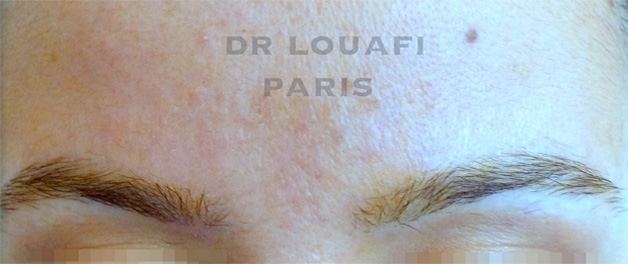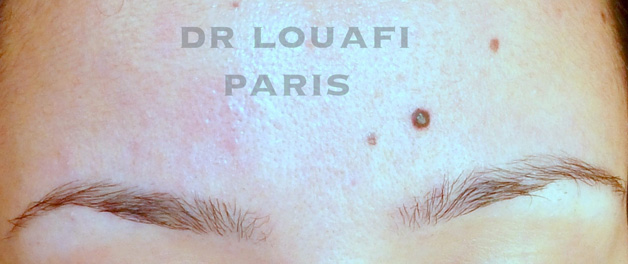Top 10 questions and answers dermatological surgery:


Dermatological surgery, performed by a cosmetic surgeon in Paris is cosmetic or reparative surgery of small skin lesions. A cosmetic surgeon in Paris specialized in cosmetic surgery explains dermatological surgery.
1 – When should one worry about a mole (nevus)?
A large mole that increases in size, has irregular edges, is asymmetrical, and is of different shades of colour or which changes over time a medical professional should look at. It may be necessary to take it out for analysis.
2 – Is it possible to remove an unsightly mole?
Yes an unsightly mole can be removed but in this particular instance the social security will not cover the procedure.
3 – What is a basal cell carcinoma?
Basal cell carcinoma is a form of skin cancer that is locally aggressive but does not metastasize. If left to evolve, it may lead to the invasion and destruction of local tissues. Complete surgical excision of the carcinoma is therefore necessary.
4 – What is spinocellualr carcinoma?
This is a form of skin cancer that can be both locally aggressive and lead to metastasis. It would need to be excised with a surgical margin for safety.
5 – What is a melanoma?
Melanoma is a form of skin cancer that may result from the transformation of a mole or which may just appear. It must be surgically removed. Treatment will require a multidisciplinary approach.
6 – What kinds of reconstruction can be achieved by dermatological surgery?
After excision of the skin lesion several reconstructive procedures are possible: controlled scarring, direct suturing, skin grafting and skin flap. Dr. Louafi, a cosmetic surgeon in Paris will advise you on the procedure best adapted to your case.
7 – What is a skin graft?
This is a procedure that specializes in replacing removed tissue. Skin will be taken from a healthy part of the body and will then be grafted on the area from which the lesion was removed.
8 – What is a skin flap?
This is the transfer of skin tissue with intact blood supply. There are several kinds of skin flap surgery. This involves the lifting of any kind of tissue from a donor site and moving it to the recipient site with an intact blood supply. This is done to fill the defect resulting from the surgical removal of skin lesions. The surgeon must possess a thorough understanding of facial anatomy.
9 – What are the risks inherent to dermatological surgery?
Performed by a certified plastic surgeon qualified in plastic, cosmetic and reconstructive surgery or by a general practitioner for small lesions) dermatological surgery is commonly practiced and is considered a sure operation. Like in all surgery complications are possible but rare. These are listed in the information flyer of the French Society for Cosmetic and Plastic Surgery. If properly managed, complications leave little or no trace. Post operation monitoring is therefore indispensable. Dr Louafi takes care of the post-operative monitoring of his patients.
Specific risks will be detailed and explained during the consultation.
10 – How much does it cost? Does the social security cover dermatological surgery?
Dermatological surgery fee vary depending on what needs to be done. The personal quote that you will get at the pre-operation consultation will detail the charges for the procedures to be performed. The surgery is covered by the social security if the treatment is for therapeutic reasons. The complementary surgeon and anaesthetist’s fees may be fully paid by your mutuelle depending on your contract with them. To give you an idea of the rates, the fee for skin lesion excision starts from 250 euros on the body and from 350 euros on the face and the neck.
face mole removal
Dear,
You are welcome to my clinic I do mole removal regularly